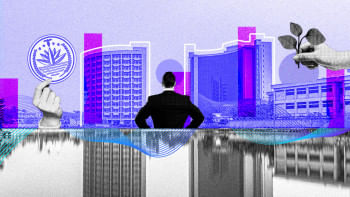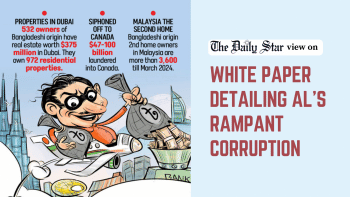Awami League’s legacy of corruption should serve as a cautionary tale

The fact that an estimated Tk 1.46 lakh crore was paid in bribes for services during the 15 years of Awami League rule is truly mindboggling. This estimate was derived by Transparency International Bangladesh (TIB) from an analysis of six household surveys conducted between 2010 and 2023. The most recent survey, which assessed the extent of corruption between May 2023 and April 2024, revealed that 70.9 percent of respondents encountered corruption while seeking services, collectively paying a total of Tk 10,902 crore in bribes.
Among the sectors analysed, passport services were identified as the most corrupt (86 percent of respondents), followed by the Bangladesh Road Transport Authority (85.2 percent), law enforcement agencies (74.5 percent), judicial services (62.3 percent), and land services (51 percent). Overall, 50.8 percent of surveyed households reported paying bribes or being forced to pay extra for services. These findings underscore how the former regime normalised corruption, compelling citizens to engage in unethical practices to access basic services.
Shockingly, the highest average bribe amount was recorded in the judicial services sector, at Tk 30,972 per household. The fact that individuals were forced to resort to unlawful measures even for legal assistance underscores the extent to which the regime undermined law and order. This not only points to the institutional decay during its tenure but also reveals that, far from maintaining a "zero-tolerance" stance on corruption as claimed, Awami League turned the country into a mafia state. Citizens were left at the mercy of systemic corruption, while mechanisms for accountability completely collapsed. Given this, rebuilding a system of checks and balances to steer the country away from this cesspool of corruption will understandably require substantial time and effort.
The consequences of such widespread corruption were catastrophic, disproportionately affecting low-income and marginalised groups. The survey also found that corruption rates were higher when individuals sought services in person compared to when using online or mixed methods, even though the latter approaches were not without flaws.
Following the ouster of the corrupt and fascist AL regime, the nation has placed high expectations on the interim government. Chief among these is the hope for substantial measures to dismantle institutionalised corruption that spread like cancer. To this end, the current government must strictly implement TIB's recommendations—such as full digitisation of services, introduction of one-stop service systems, and strong legal action against those involved in corruption. Additionally, it must comprehensively reform institutions tasked with combating corruption, such as the Anti-Corruption Commission.


 For all latest news, follow The Daily Star's Google News channel.
For all latest news, follow The Daily Star's Google News channel. 










Comments